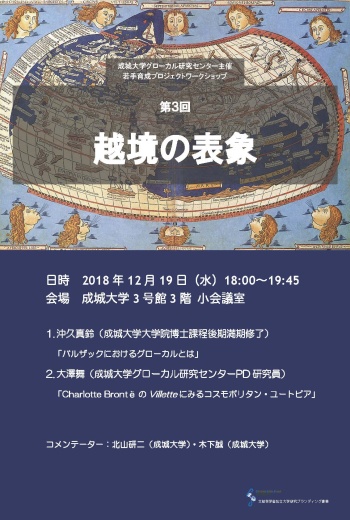

Youth training workshop to be hosted by the Center for Glocal Studies, Seijo University “3rd session: Representations of Cultural Border Crossings”
event date:2018.12.19
The Center for Glocal Studies is hosting the following symposium. No registration is required and admission is free. The event forms part of Seijo University’s MEXT-supported Research Branding Program for Private Universities.
Center for Glocal Studies, Seijo University
Youth training workshop
“3rd session: Representations of Cultural Border Crossings”

<Dates & Venue>
Date : Tuesday, December 19, 2018, 18:00–19:45
Venue : Small conference room, Floor 3, Building 3, Seijo University.
Directions can be found here
(The venue is a four-minute walk from Seijogakuen-mae Station on the Odakyu Odawara Line.)
Hosted by : Center for Glocal Studies, Seijo University
Language : Japanese
<For further information>
Center for Glocal Studies (CGS), Seijo University
Seijo 6-1-20, Setagaya-ku, Tokyo 157-8511, Japan
Phone: 03-3482-1497 Fax: 03-3482-9740
Email: glocalstudies[at]seijo.ac.jp
*When you send an email, please replace “[at]” with “@”.
<Speakers and themes>
1. Marin Okihisa (Seijo University, graduate school coursework completed without degree)
“How is ‘Glocal’ Understood in Honoré de Balzac’s Work?”
2. Mai Osawa (Postdoctoral Fellow at the Center for Glocal Studies, Seijo University)
“The Cosmopolitan Utopia in Charlotte Brontë’s Villette”
Commentators :
Kenji Kitayama (Seijo University)
Makoto Kinoshita (Seijo University)
<Summary>
Seijo University’s Center for Glocal Studies (CGS) will hold a presentation-skills workshop for young researchers, titled “Representations of Cultural Border Crossings (3rd session),” as part of the CGS’s efforts to promote glocal studies (a discipline that examines glocal phenomena—interactions between globalization and localization).
The globalization and localization of people and animals are represented in literature in various ways. We tend to regard globalization as a modern phenomenon, but it is a process that has emerged, slowly but surely, since before the Age of Discovery. Geographer and economist David W. Harvey writes, “The long history of commercial expansion that has been with us since at least 1492 [when Columbus reached America] if not before (and which we now refer to as ‘globalization’) depended upon the accumulation of certain kinds of geographical knowledge.” This workshop explores the representations in literature of such “commercial expansion,” as well as the globalization the expression also connotes.
The workshop focuses on glocal representations in the works of French writer Honoré de Balzac and British writer Charlotte Brontë. The former work depicts scenes of animals traveling globally, and the latter depicts humans traveling globally. How did the animals and humans react to the foreign climates, and how did the people of these climates react to them? How did these animals and humans become accepted and localized in the new lands? Why did they cross over the border, and what did these transnational migrations represent?